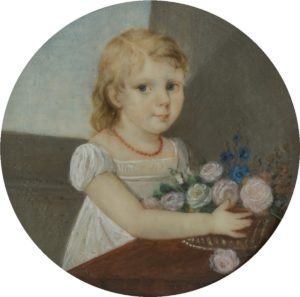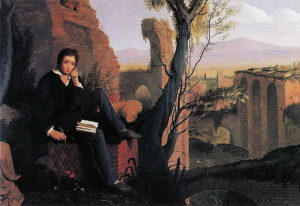
Allegra
“Papa! Papa!” shrieked Allegra. The pretty little three year old girl, her father’s dimple in her chin and with sparkling eyes, propelled herself into Lord Byron’s arms.
“Gently, gently, mia cara. What? You are pleased to see Papa again? But you know I said you should.”
“Will you stay with me this time, Papa?”
“We shall see. I think you will enjoy going into the country, in this hot weather, my Allegra. And here is Shelley you see – he will take you.”
“I don’t have to stay with Signora Hoppner not any more?” the child whispered, turning back to look at the older couple.
“Why, Allegra, you talk as if you do not care for us,” Mrs. Hoppner chided. “And have we not been kind to you? Dear Byron, I assure you, we have spared no attention that we could give to this precious child…”
“And I am very grateful, Mrs. Hoppner. It has been great relief to know that she was safe with you and the Ambassador, and I am sensible of your great trouble. But we shall have a different arrangement for the rest of the summer.”
“And you will come with me, Papa?” the child persisted, clinging to him.
“Perhaps. Now we must be polite to our guests, cara. There are some new cats for you to play with – where is Elise?”
“Come, Allegra.” The trim Swiss maid bent down to take the child.
Byron turned to the Darcys and bowed a welcome. “And now I can properly attend to my company. Thank you for coming, Mr. and Mrs. Darcy. I do apologize for you finding me at a domestic disadvantage.”
“No such thing,” Darcy assured him politely.
“We are used to children,” Elizabeth smiled. “Allegra is about of an age as our Jane, if you would like a playfellow for her.”
“Playfellow! I like that!” Lydia stepped out indignantly. “Who is Jane to Allegra? Let me tell you that notice ought to be paid to *my* child, who has the best right to know Allegra! Look you here, Byron. This is your son. Is he not the very spit of you? I swear, he has the same cleft chin that you have, and as his sister does! See that!” She held up the babe.
“He is not my child, and I do not own him,” Byron said calmly. “Mr. and Mrs. Darcy, will you allow me to present my friend Shelley?”
“It is an honour to meet you,” said Darcy civilly, while Elizabeth curtsied.
“The honour is for me,” said Shelley agreeably. “I understand you like poetry, Mrs. Darcy – may I ask, who is your favorite poet?”

“Why, sir, you put me in an awkward position for an answer in such company. If I said that I prefer you of all poets, I shall offend our host; and if I said Byron, I should make no friend of you.”
“Shelley is the last person to put you on the spot, Mrs. Darcy, and I will say in his favor that he is not vain. You are free to name another – though you may then be fairly be criticized, I give you warning. We poets have our prejudices.”
“Heavens, I feared as much. Well, if I may say ‘except present company,’ then, perhaps I will be safe in naming Wordsworth. Surely he is beyond reproach. May I have hopes that you find such a choice unexceptionable, and will not despise me.”
“Wordsworth is a respectable choice, Mrs. Darcy, indeed an impeccable one, for both Shelley and I think most highly of him. He is unquestionably one of the very best poets practicing today. But I suspect you of a bolder choice still. You are hiding something. Go on, be candid – I am sure you need have no fear of us.”
“Indeed I have no fear of you, but I do confess there is an element of awe in my feelings. Do you remember, my dear – “ she turned to her husband – “when first I met your aunt, I determined that I would never feel awe merely in the face of money. You know Lady Catherine de Burgh, I think, sir.”
Lord Byron recoiled. “I do indeed, and live in holy horror of being attacked by her again. If you will forgive such an ungallant speech about your relation, Mr. Darcy.”
“You need not suppress any expressions of your opinions on my account, Lord Byron,” said Mr. Darcy dryly.
“But it is hard to compare your introduction to Lady Catherine to that of Shelley,” said Byron. “There could be no two characters less alike. And Shelley is not possessed of enough money to inspire awe.”
“The similarity of the two introductions announces their characters,” Elizabeth told him. “My opinion may mean little to either, yet Mr. Shelley introduces himself with all humility, in a way Lady Catherine never could, with all her vanity. He is both a gentleman, and an artist, while Lady Catherine has no claims to either manners or talent. As for myself, I have some reason to feel awe at this meeting. You see, sir, I have read ‘Ozymandias.’”

“Have you indeed?” Shelley brightened. “You are admirably up on all the new things, then. It was in a very late issue of The Examiner.”
“We take that in at Pemberley,” said Darcy with a smile, “and very edifying it is.”
“And what were your thoughts on reading ‘Ozymandias’?” asked Byron, raising an eyebrow questioningly.
“I am no politician, Lord Byron, and you press me very hard. I am a great admirer of your latest Cantos. But I think I have never read a poem in the least like ‘Ozymandias.’ What power, what brilliance! ‘I met a traveler from an antique land…’ That is why I feel awe in meeting Mr. Shelley.”
He bowed half shyly.
“You see, Shelley, I told you she was a young lady with a fine mind, as well as fine eyes,” Byron commented.
“A very dangerous combination, were I not so well satisfied at home,” Shelley remarked, “and Mrs. Darcy’s own happiness is itself visible.”
“Your wife is the author of Frankenstein, I know,” said Darcy with admiration. “Mrs. Darcy and I took turns reading that to each other, with our hair standing up in fright! It is a most unique, and original work, that can only have come from a woman of exceptional mental powers.”
“We are fortunate in our wives,” Shelley agreed, smiling at him.
“Were I so blessed as you two gentlemen, my life might have taken a whole different course. Would that I could find the equal of a Mrs. Darcy or a Mrs. Shelley,” mourned Byron, yet Elizabeth could spot a sardonic twinkle in his eye.
“You would not know what to do with such,” retorted Shelley. “And it may not be fair to remind you, but you had a wife with a mathematical genius, if I am not mistaken.”
“Too true,” he shuddered. “I did seek intellect, I am not ashamed to admit; but her real fault was a narrow-minded, stubborn nature. You will do me the favor not to remind me of my Princess of the Parallelograms. No, the thing is impossible; I know I never shall find a Mrs. Shelley or a Mrs. Darcy of my own in this lifetime.”
Lydia was incensed and raised her voice in protest. “Why, Byron, do you forget? You have me, and I am as fine a lady as my sister any day, I assure you, besides being stouter and handsomer. And what is more, I am the mother of the only son you may ever have!” She dangled the child before his eyes, again.
“It is a fine child, certainly, but it already has a father. You forget your own husband, Mr. Wickham. I suggest you tell him of the happy event, madam.”
“But I swear I can’t. He’s nowhere to be found. And besides, the child *is* yours! Do you not see the likeness? And you know as well as I do that we had an…attachment. Can you deny that?”
“An attachment! A few moments snoggling when we were both masked, is no proof of any thing.”
“But I can bring proof!” Lydia screeched. “Them there! They saw us go into the little room together and can swear it to the magistrate!” She pointed frantically at her sister and brother-in-law.
“Take care, Lydia, you are offending your sister and trying my patience.”
As Lydia tried to push the baby into Byron’s arms, it began to wail. “Take your son, Byron! Give me the right to call him George Gordon, after you!”
“It is a matter of entire indifference to me what you call him, Madam, but giving him such a name might possibly offend Mr. Wickham.”
Allegra, who had been playing with a litter of half a dozen kittens, looked up, interested. “Papa? Is that baby truly my brother? May I play with him?”
Mrs. Hoppner, after a look at her husband, stepped forward. “Good evening, Mr. Shelley. Mr. and Mrs. Darcy. We are charmed to see you again. Would you wish me to relieve you of dear little Allegra, Lord Byron? I can take her into the kitchen for some sweet-meats.”
“If you would,” Lord Byron said gratefully. “She ought to have something sustaining, I have been thinking. She is looking rather pale.”
“We have been taking excellent care of her, I assure you, Lord Byron, and she has wanted for nothing. She is perfectly well, I assure you. Venice makes children pale.”
“Well, well, take her away, do, Mrs. Hoppner. Give her something to eat. We shall have some peace and talk poetry for a change.”
When the door closed behind her, Byron could not help remarking, “The veriest gossip in all the Veneto, I protest. What a pity she is here just now. She will spread stories about us all over Europe. I beg your pardon, Hoppner.”
“No offense taken, your Lordship. My wife does have a tongue on her. It hangs at both ends, I must admit that. But I will do all I can to prevent her talking about your affairs.”
“Just having the care of Allegra must give rise to talk, I fear,” Byron answered ruefully, “but I was pressed, and hope that you by no means think I am ungrateful.”
“I should so like my little George to get to know and love his own sister,” lamented Lydia.
“Cannot you find Mr. Wickham, Mr. Darcy?” asked Byron, desperately.
“We have not tried very hard,” Darcy sighed. “I fear that we are not altogether desirous of having him turn up, like a bad penny.”
“Still, we cannot return home without finding Wickham, to take care of Lydia,” Elizabeth reminded him. “Have you any ideas as to where he may have gone, Lord Byron?”
“Well…he is such an aficionado of the opera ladies,” said Byron thoughtfully. “I should think a night or two at the opera and you might have a sight of him with his latest inamorata, and patroness.”
“But if he has won a patroness, how is he to be induced to return home, by any means but shameful bribery?”
“A cottage in another country can be provided,” Darcy said tonelessly, “if we should be so fortunate as to find him between mistresses. That would not be entirely unsatisfactory.”
“But that is not very nice, Darcy,” Lydia objected. “My children and me want to live near my mother.”
“All that is yet to be decided. The first object is to see you all on your way back to England.”
“And will you follow us to England, my Byron?” Lydia asked tenderly.
“Good God, no. I am off to Pisa to the winter with my new love, a black-eyed Contessa. Give over, Mrs. Wickham, you will do much better with your husband and the Darcys. They have at least some intentions of responsibility toward you, whereas I have none at all.”
She started to protest, but he cut her off. “Now it is time to go in to dinner,” he said firmly. “Allegra will be put to bed, and may I suggest, Mrs. Wickham, it will be best if you go back to your own quarters for dinner, and take care of your own child. He seems to be getting fretful.”
“Fretful! Did you ever see a finer boy, Byron? And with such a look of you. His true parentage is so very obvious, it is no use for me ever to deny to the world who his father really is.”
“If you like,” he shrugged. “That will not help your reputation however.”
“Oh very well. You are so tiresome, you have made me tired. I will go back to our apartments. My milk is leaking, and don’t you complain, Lizzy, though it is your dress.”
“We can call the Hoppners back, and proceed in to dinner,” said Byron.
“Yes. And I will like to continue our sensible conversation with Mrs. Darcy,” put in Shelley. “I do suspect, madam, that you are hugging another poet to your heart, quite a different one than myself or Byron, yet not Wordsworth either.”
“It is very true, Mr. Shelley. I have a liking for Cowper. What think you of that?”
“No poet with such a feeling for nature can meet any disapproval from me, and I do admire your choice.”
Just then a scream was heard from the door.
Every one jumped up. “Is that Lydia? I thought she had gone,” exclaimed Elizabeth.
Her sister reappeared in the saloon doorway, wild eyed and still clutching her child, and with Lady Catherine de Bourgh beside her.
“Lizzy! You will never guess who is here!” she gasped.
“I can see that much for myself. Have you come to dinner, Lady Catherine?” she said coldly.
“Not I. I would disdain to dine in a house of such dreadful immorality,” her ladyship retorted haughtily. “But I wish to announce to you all that I have provided myself with an escort who will take me home to England, since none of you are evidently going to do so. I have quite lost my patience, so I wrote to him some time ago, and he is just arrived.”
“Well, I suspect you want to tell us who it is, so why do you not do so?” suggested Mr. Darcy.
“So I will. I told him to come here once he was comfortably settled in; and here he comes.”
A gentleman stepped diffidently into the room. Lord Byron, Shelley and the Hoppners stared with all their might, but the Darcys and Lydia all exclaimed together, for once with one voice:
“Mr. Collins!”

7 comments
Skip to comment form
OMG that is all they need 😱! But hopefully he will agree to escort Lady Catherine and Lydia with her baby back to England and they can leave immediately?🙏. I imagine then that Darcy can purchase a new wardrobe for Elizabeth as most of her current one has been ruined by that selfish, careless brat!🙄
I think that Mr. Collins will have to air his considerably opinionated opinions on the immorality he finds in Venice first, though, don’t you agree?! At any rate I can’t stop him.
🤣😂🤣😂🤣 I doubt even Darcy can! 🤣😂🤣😂🤣
I have so enjoyed reading your “serial”. Cannot wait to have the full book and read it in its entirety.
Dear Hollis, thank you for the encouragement – much appreciated! Just a few more episodes and we’ll be there! 🙂
Mr. Collins, Lydia, Lady Catherine, and Byron in a room together! Whoa! Now that is a dinner party… Thanks for this scene, Diana!
I’m kind of drooling over the possibilities! Think it posts Aug 22, though at the moment it is still only a delectable stew in my mind…not sure what will happen!